New Arrivals – December 21, 2004
Edited by John Stevenson
Got Tech? Send press releases, news, and tech questions to the
Cyclingnews tech-heads.
Welcome to New Arrivals, a section showcasing the latest equipment
that's landed on the Cyclingnews tech desk. Look out for reviews over
the next few months when we've clocked up some saddle time with this stuff.
Look KG481SL frame
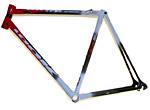
|
Look 481SL frame
Look's 481SL frame is one of the most under-stated carbon fiber
frames we've seen. While many carbon frames go for big tubes and
sweeping curves, the 481SL looks from a distance like a very conventional
lugged frame, and it's only when you get up close that you realize
it's not steel or aluminium, but carbon fiber.
Our 481SL came with Look's HSC5 SL all-carbon fork which at a mere
300g is the lightest fork we've measured, and is reliably reported
to be among the lightest in existence.
Also included in the package is Look's intriguing Ergopost 2 Ti
seatpost. The Ergopost has three placements for its single-bolt
saddle cradle, allowing for a huge range of seat position adjustment.
More info: www.lookcycle.com;
US importer: www.veltecsports.com
Related story: It's
not all about weight - Look's president talks bikes and grams

|
Look Keo pedals
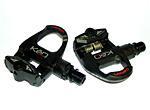
|
Look Keo pedals
Look pioneered modern clipless pedals (which, for the generation
that also can't remember vinyl records, are so called because they
lack the 'clips and straps' that used to attach to metal cage pedals).
But over the last few years Look's design has started to seem a
bit long in the tooth, and has come under pressure from various
lighter alternatives.
The Keo pedal is Look's answer and - on first impressions at least
- it's a good one. It's functionally very similar to Look's previous
pedals, so long-time Look users won't find it alien, and uses the
tried and true three-bolt cleat attachment. It's been slimmed and
trimmed and uses a carbon fiber body with an option of a titanium
axle to hit claimed weights of 190g/pair for the titanium version
and 230g/pair for the steel-axle incarnation. In fact we measure
the steel version at 225g/pair, which is extremely respectable and
with the 70g cleats makes them the lightest steel-axled pedals we've
seen.
Cyclingnews will have a review of the Keo pedals in the
next few days.
More info: www.lookcycle.com;
US importer: www.veltecsports.com
Related story: Tweaking
a standard: Look's Keo designer talks pedals & It's
not all about weight - Look's president talks bikes and grams

|
Shimano's new Ultegra group
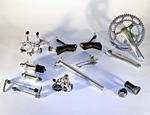
|
Shimano Ultegra group
As sure as night follows day, the introduction of a completely
new group at the top of the Shimano component ladder is followed
a year later by new gear on the next rung down with most of the
features, a bit more weight and a lot less wallet-damage. And so,
as late 2003 saw a completely new Dura-Ace group, as 2004 draws
to a close the first batches of new Ultegra start to hit bike shops.
At first glance it's really quite hard to tell the new Ultegra
from Dura-Ace. Similarities abound, from the two-piece chainset
to the reshaped brake/shift levers and the adjusters on the brakes.
And of course, like its big brother, the new group has ten rear
sprockets rather than nine. When you throw the parts on the scale
the differences are more clear, and it turns out that Dura-Ace is
still where Shimano's gram-counting attention is - Ultegra sees
a few small gains here and there, but for the most part large amounts
of mass have not been shed compared to the previous incarnation.
We'll have a deeper look when we've got these parts on a bike,
in the new year, but for now here are numbers for the weight-weenies
out there:
Brake calipers 330
Brake lever/shifters 490
Chainset 840
derailleur, front 90
derailleur, rear 205
Hub, front 145
Hub, rear 355
Seatpost 215
Skewer, front 60
Skewer, rear 65
More info: www.shimano.com

|
Shimano WH-R550 rear wheel
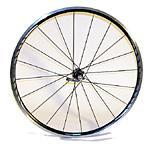
|
Shimano WH-R550 wheels
Shimano's latest wheels sit at the 105 level in the company's now-extensive
hoop line-up. This means there's rather a large gap between the
WH-7800 Dura-Ace wheels and the R550's, but given the features the
new wheels share with Dura-Ace, the under US$300 asking price makes
them excellent value compared with the Dura-Ace wheels at about
US$800.
Features that the R550s share with Dura-Ace include bladed steel
spokes, 20R/16F spoking, 24mm low-profile rims and straight-pull
spokes. Of course you don't get something for nothing and the downsides
of the R550s are weight and distinctly less-smooth bearings (though
experience with Shimano components suggests that careful adjustment
and a bit of break-in wear soon has them running smoothly). Nevertheless,
they look like a solid candidate for training and commuting wheels.
More info: www.shimano.com

|
Park Tool PRS-15
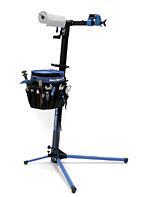
|
Park Tool PRS-15 workstand
There's something slightly sad about getting excited over a workstand,
but if I were still wrenching for a living (and I admit it's been
a long time since I wielded a spanner professionally) I'd want a
PRS-15 in my quiver of bike-fettling bits.
The position of the PRS-15's new Extreme Range Clamp is height-adjustable
from 102cm to just over 150cm and will grab a frame tube from 24mm
to over 75mm across, a combination that means you should be able
to work on just about any bike with the PRS-15. Five points of contact
with the ground (two adjustable for stability) mean it sits steadily
on any surface and there are four attachment points for accessories
such as the BTK-1 bucket and tool kilt, TS-1 truing stand attachment
and PTH-1 paper towel holder.
More info: www.parktool.com

|
Park Tool BTK1
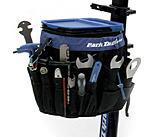
|
Park Tool BTK-1 bucket and tool kilt
An accessory for the PRS-15 workstand, the BTK-1 consists of a
large polyethylene bucket surrounded by a nylon tool holder with
40 pockets. The bucket can be used for cleaning bikes, or just as
a handy place to dump parts as you work on a bike in the field,
while the kilt should provide enough storage for any mechanic's
tool needs.
More info: www.parktool.com

|
Continental GP Attack
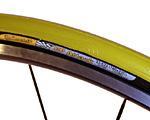
|
Continental GP Attack & Force tyres
Front and rear tyres do quite different jobs, even on bicycles
where there isn't the dramatic difference between the driven and
undriven wheel that you find on, say, motorbikes. Nevertheless,
it makes sense that, for example, the tyre that takes the larger
load would be fatter. Continental's new force and Attack tyre pair
are designed as a complementary duo of front (Attack) and rear (Force).
In back, the GP Force is 23mm wide for traction and comfort and
uses a five-layer carcass for puncture prevention (rear tyres get
more punctures than front because punctures happen when a piece
of glass is flipped up by the front tyre and so presents a sharp
edge to the rear tyre.) Its upfront companion, the GP Force, is
slightly narrower at 22mm for better aerodynamics, has a slick centre
for reduced rolling resistance and a four-layer carcass.
Continental GP Force
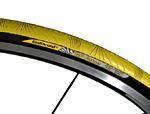
|
Other differences include a stickier rubber compound for the GP
Force, and differences in the tyre profiles for their specific purposes.
Both tyres are available in four colours - red, blue, yellow and
anthracite - so you can get a match for your bike's colour scheme.
Australian readers will also be interested to learn that the GP
Force and Attack are covered by Continental Australia's 'Performance
Tyre Guarantee' which provides a discounted replacement for any
tyre that suffers a penetration puncture in the first three months
after purchase. This is a trial scheme in Australia only at the
moment, though Continental Germany will be reviewing it in mid-2005.
Worldwide, the company offers a similar 'Safety System Guarantee'
on its Contact range of puncture-resistant touring and city tyres.
More info: www.conti.com.au

|
Giordana Tenax Laser shorts
and jersey
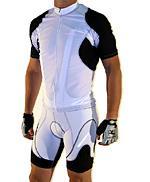
|
Giordana Tenax Laser bib shorts and jersey
Giordana's tenax Laser jersey and bib shorts are some of the most
advanced we've yet seen in terms of the attention to detail that
goes into their construction. Both feature Moovix fabric that Giordana
says provides consistent compression and stretch in all directions,
and have laser-cut perforations in the fabric for cooling.
Moovix is a hollow micro-fiber with a honeycomb structure, that
incorporates nylon and DuPont Lycra. It can stretch equally in all
directions, not just the two and four way stretch of standard 'spandex'
materials. It's opaque to UVA and UVB rays and the honeycomb knit
means that it is very efficient at moving moisture away from sweatyareas
of the body. It also features an antibacterial treatment to help
prevent it getting smelly.
Our set came in white with black and red detailing, a colour scheme
that you'd have to be pretty self-confident to carry off - one Cyclingnews
staffer remarked that it was very Cipo. For the more modest, there
are black and red versions too.
More info: www.gitabike.com

|
Descente Genesis women's
jersey
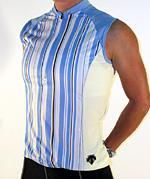
|
Descente Women's D-Lite tech T & Genesis sleeveless jersey
Descent D-Lite Tech-T
Photo ©: Paul Mirtschin
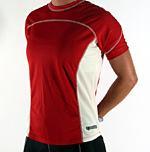
|
Spring might seem a while away, but it'll soon be warm again and
time for the summer wardrobe. Descente's line for 2005 offers an
extensive selection of women's clothing including these two shirts,
the road-styled Genesis sleeveless jersey and the more casual/mountain
bikey D-Lite tech T.
The Genesis is made from Descente's H2Zero moisture-wicking fabric
and has two rear pockets and a tapered collar for a better fit.
It's available in five striped and floral prints and in sizes from
S to XL.
The D-Lite tech T also features H2Zero fabric and a high neck to
keep the sun off for those all-day off-road rides. It's available
in three colours: cardinal (red), Periwinkle (Pale blue) and Mocha
(brown).
More info: www.descenteboulder.com

|
The latest Zero Gravity brake
(left)
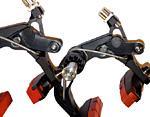
|
Zero Gravity 2005
The latest version of Zero Gravity's featherweight brakes boasts
a new cam design for increased braking power. Zero Gravity designer
Ted Ciamillo came up with the new shape after an preliminary review
on Cyclingnews commented that the Zero Gravities provided good stopping
power, but weren't as powerful as the best conventional dual-pivot
brakes. Shortly after that review appeared, Ciamillo wrote to Cyclingnews,
saying, "After your review, I re-visited the travel vs. power problem
and had an exciting idea; surely great travel comes at the price
of reduced power, but what if the power and travel were dynamic
through the stroke of the cam-lever? In other words, what if the
cam-lever could be made to produce high gains in travel at the beginning
of the pull and then gradually trade off toward high gains in power(or
more accurately clamping force) at the end of the pull."
Ciamillo calls this a 'kneeing' effect because, "it works similarly
to the way the knees of your legs work. Think about the squat rack;
you have a tremendous amount of strength in the last few degrees
of extension of your legs but there is very little vertical movement."
The new cam is a feature for the front brake only, as the rear
has more than enough oomph to easily lock the wheel.
More info: www.zerogravitybrake.com

|
Bicycle: the history
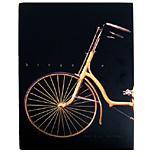
|
Bicycle: the history by David V Herlihy
Stuck for a last-minute present for a cyclist? You could do a lot
worse than this well-produced history of the bike, from a germ of
an idea for human-powered vehicles in the late seventeenth century
to modern road racing, touring and mountain bikes. At 470 pages
and extensively illustrated, it's far and away the most attractive
tome of it's kind that we've seen and from a brief dip into its
pages so far, Herlihy's engaging, clear style is a pleasurable read.
More info: yalepress.yale.edu
or purchase
from Amazon

|
|















